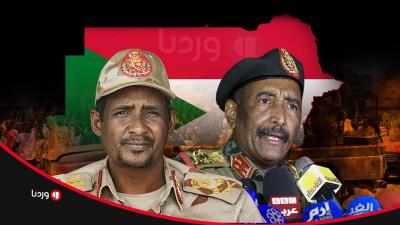The Sudanese army chief and his regular forces are facing fighters skilled in urban warfare who support one of the former warlords, in a battle that is pounding the capital, Khartoum, and bringing Sudan to the brink of civil war. Army chief, General Abdel Fattah al-Burhan, controls heavy weaponry and the air force, but his soldiers are up against a paramilitary force led by a wealthy former leader of one of the groups, General Mohamed Hamdan Dagalo, known as Hemeti.
The Rapid Support Forces, led by Hemeti, which analysts say may include over 100,000 fighters, have proven to be a slippery opponent as they abandoned attacked bases in the capital and have concealed themselves in residential areas, where they lose their advantage in heavy armor and conventional military tactics.
After the collapse of the alliance between Burhan and Hemeti, the two men are fighting to deliver a lethal blow in a power struggle that could instead lead to a prolonged conflict and further instability, undermining prospects for peace and economic recovery in Sudan after decades of dictatorship, military rule, and international isolation.
The fighting that broke out on Saturday has resulted in at least 299 deaths and 2,600 injuries, forcing dozens of hospitals to close and pushing residents to seek shelter in their homes due to dwindling supplies.
Hemeti, who has not completed his education, is now in his late forties and began his life as a camel trader in Darfur. Mohamed Saad, a former aide, said, "Hemeti took up arms for the first time after men attacked his trade convoy, killing about 60 people from his large family and stealing his livestock."
Hemeti honed his combat skills after his supporters and other irregular forces allied with the government to help suppress the rebellion that erupted in Darfur in 2003. The groups became known as the Janjaweed, a name derived from a phrase meaning "a genie riding a horse," earning them a fearsome reputation. The International Criminal Court accused then-Sudanese President Omar al-Bashir of being the mastermind behind genocide, crimes against humanity, and war crimes in the campaign to crush the rebellion.
Bashir and his government denied the allegations of atrocities, saying that "only the rebels were targeted in the years-long conflict, which resulted in the deaths of around 300,000 people and the displacement of two million."
In the midst of the bloodshed, Hemeti gained Bashir's attention, who had come to power in a military coup in 1989. Hemeti's group, which transformed into the Rapid Support Forces, became an enforcement force used by the government. Bashir also empowered his family and aides to sell Sudanese gold, helping him amass a fortune.
Hemeti turned against his benefactor after Bashir was ousted in 2019. Following this, Hemeti assumed the position of Vice President of the Sovereignty Council, which is under Burhan, and transformed into a politician giving speeches, meeting with Western diplomats, and gaining support abroad.
Similar to the Sudanese army, the Rapid Support Forces sent fighters to Yemen, where Arab Gulf states have been waging a proxy war for years against Iran-backed Houthis. An opposition figure stated, "Hemeti is planning to become the number one man in Sudan. His ambition knows no bounds," requesting anonymity for fear of retribution.
While the Rapid Support Forces may lack traditional military discipline, they consist of skilled fighters armed with Kalashnikov rifles, rocket launchers, and pickup trucks fitted with machine guns, making them a highly mobile force. The forces have maintained their reputation for instilling terror. Protesters accused them of being responsible for a bloody crackdown on a sit-in camp in Khartoum in 2019 outside the Ministry of Defense after Bashir's ousting, where over 100 people were killed. Hemeti denied any involvement in the incident.
Hemeti's rival is a completely different character. Burhan is a soldier who has spent 41 years in military service, most of it under Bashir. Under Bashir's rule, Sudan became an international pariah and was placed on the US terrorism list, with sanctions crippling its economy. Burhan, now in his early sixties, has proven to be a skilled politician, rising to prominence under Bashir before turning against him, saying he was among the military figures who called for Bashir to step down.
Since Bashir's ousting, Burhan has become the de facto leader of Sudan and established a power-sharing agreement with civilians to place Sudan on a three-year path towards democracy. After assuming power, Burhan stated, "What the country is going through now is a real threat, a danger to the dreams of the youth and the hopes of the nation.” He pledged to hold elections in July 2023 and to hand over power to an elected civilian government. However, opposition members who have taken to the streets say he has entrenched the army’s grip on power. Protests against the military's control have been met with strong responses from security forces.
Although Burhan and Hemeti rose to prominence under Bashir, the Islamists who were one of the pillars of Bashir's rule for three decades might want to defeat Hemeti and see Burhan's regular army triumph and return their military allies to power. Pro-democracy groups stated that "the loyalists of the Bashir era, or those referred to as the remnants of the old regime, may seek to return under the cover of darkness amid the army's fighting with the Rapid Support Forces."
The battle for Khartoum is currently raging amid fierce combat for control over strategic sites such as the airport, the army headquarters, and the state television. Neither leader has backed down. Burhan has ordered the dissolution of the Rapid Support Forces and declared them a rebel group. Two military sources stated that "the army wants to integrate the Rapid Support Forces into the regular army to bring them under its control." Hemeti, who referred to Burhan as a "criminal" in an interview with Al Jazeera, stated that they know where Burhan is hiding and that they will reach him, handing him over to justice or ensuring he dies.




